- Home
- Will Hobbs
Far North Page 16
Far North Read online
Page 16
No more than fifteen feet from me, the bear came to an abrupt halt and stood up roaring, a mountain of ice and claws and teeth. I held out the ax toward the bear, without quite looking him in the eye, and spoke as calmly as I could manage: “We keep this ax real sharp, winter bear. If you try to hurt me, I’m going to floss your teeth.”
The bear glanced toward the cabin. I heard Raymond’s voice over there say something in Slavey and then add “Go away” in English.
The bear went down on all fours, eyeing me, then Raymond. Its nose was twitching; I realized he smelled the meat. I backed up a couple of steps, bent down slowly, then tossed the meat in its direction. The grizzly took the meat, then retreated twenty feet or so. It stood once more, with the meat in its mouth, then loped into the trees with a shuffling gait, its head held close to the ground.
My knees were so weak I could barely make it to the cabin. “Floss his teeth?” Raymond said as I reached the door.
“I didn’t know what to say!”
“You sounded like you meant it.” Raymond hopped back inside, taking a seat at the table. “You did everything right.”
“I was all jelly! What did you say? If you hadn’t distracted him…Did you say something in Slavey?”
“I called him ‘friend.’”
“How come you said it in Slavey?”
“I didn’t think about it…. I guess because I figured he would understand Slavey.”
I busted out laughing. “That sort of makes sense. Sorry I had to feed him.”
“I think that was a pretty good idea.”
“Will he come back?”
“I don’t know. Keep watching out for him. A bear in that condition might stalk a human being.”
My heart was still hammering like thunder. “What if he comes through the door?”
“There’s nothing we could really block the door with if that bear wanted to come in.”
An hour later, just as it was getting dark, I got up enough courage to peek outside. It was starting to snow in stinging, miniature crystals. I covered my stack of wood outside with the tarp and leaned the toboggan up against the back of the stack. Then I brought in as much wood as we could keep inside the cabin. I stacked quite a bit of it against the door. “I’ll have to rearrange it to go back outside,” I said to Raymond, “but as my dad always says, ‘What’s time to a hog?’”
“I don’t get what that means,” Raymond said.
“It makes more sense than a lot of his jokes. Try this one: ‘What’s the difference between a duck?’”
“‘Between a duck’?” Raymond repeated. “I don’t get it.”
“Neither do I. Are you ready for the answer?”
“I’m ready.”
I smiled, just like my father always did when he told this, and said, “The other leg is the same.”
Raymond still looked confused. I said, “Don’t bust a gut trying to figure it out. I’ve been working on it for about ten years. How’s your foot?”
“Maybe a little better.” I couldn’t tell if he believed it or not. Maybe the pain medicine was helping him to believe it, but he was going to run out of the pills soon.
“Your hair’s getting long and shaggy,” I told him.
“So is yours. You got a beard now, too.”
I stroked what was left of my face after all the wind and cold and that woolen mask. “Feels like a poor excuse for a beard. Glad we don’t have a mirror along—we’d scare ourselves to death.”
“I got a scar here on my forehead?”
“It looks great—gives you even more character. We won’t cut our hair—we’ll be rock-and-roll stars.”
He was amused, but he said to me thoughtfully, “I want to get another guitar. Maybe learn fiddle, too. Some of those old guys could teach me fiddle.”
Raymond asked me to bring down one of the remaining beaver pelts that Johnny had stretched with willow frames and hung up on the wall. Then he took the sheath knife off his belt and started carefully scraping the fur from the hide. “I want to try to fix up Johnny’s drum,” he explained. “Make a new drumskin for it.”
“Sounds like a good idea,” I said. “That wolverine really made a mess of it.”
I kept watching the weather. It warmed all the way up to zero and just kept snowing. Now the snow had some moisture in it; it was quite a bit heavier. I fretted about the new snow making it harder to pull the toboggan when we were ready to leave, but there was nothing to be done. We just had to wait for Raymond’s foot to heal. I wished I had a book to read. It would take my mind off the waiting and also off thinking about what was going to happen to us. Then I got an idea. Actually, watching Raymond work on that drum made me think of it. I could try to make a model of a log house, just like the one my father and I were going to build down in the hill country. I got really excited just thinking about it.
Over the next four days, every time I went out with the ax to go chop ice at the creek and haul water, I also brought back alder branches. Smooth and straight and strong, with thin dark bark, they made perfect model logs. I laid out the base of the log house just a few inches in from the edges of the table. This was going to be a sizable model. Knowing my dad, he wouldn’t settle for a simple rectangle. And he’d want it to be huge, two stories high where you walked in the front door. He’d mentioned a special room for a pool table—I wasn’t going to leave that out.
I enjoyed notching all the little logs, making the door and window openings, thinking about how I was going to do the roof. I let my mind drift, and it shortly drifted from sentimental to morbid. I was thinking that if I did end up dead, at least my dad would get to find this log house I made for him. He’d come here after somebody found us, they’d figure out we’d been staying at this cabin, he’d know I’d been thinking about him….
After studying the construction of Johnny’s hand drum, Raymond had removed the torn drumskin and fitted his new one over Johnny’s birch frame. He reworked the fine spruce roots in a perfect imitation of Johnny’s lashing where it ran through the birch frame and crisscrossed on the underside of the drum.
We would work silently for a long while, and then we’d get to talking. Our conversations went on far into the night. Raymond had much more curiosity than I’d ever realized about what life was like down in the States, or “the South,” as he called it. At first I thought he was talking about Mississippi, Alabama, Louisiana, and so on, but then I realized that everything south of the Northwest Territories was “the South” to him. He was trying to picture how big San Antonio was, and I told him it had more than a million people. He kept trying to picture all those houses, all those people, all those cars and freeways. “I don’t think I’d want to live there,” he said. “Too many people. What we got up in the North is lots of land.”
I told him about the piece of land close to my grandparents’ place, how it used to be covered with hundreds of live oak trees, and how I would always climb into this one certain tree and hang out there. I told him that when they built a big shopping mall on that land, they didn’t even save one tree when they made the parking lot.
“How come?” he said.
“Because it was too much trouble, I guess, and would’ve added cost. To find open land, you have to go farther and farther away.”
He was trying to picture it. Then he asked, “Is it true that people are always shooting each other? Like it looks like on TV?”
“It’s in the news every night,” I admitted.
“What about suicide?”
It seemed like a strange question. “I guess it’s a big problem,” I said. “I don’t know much about it, really.”
Then he talked about growing up in Nahanni Butte, about fixing snowmobiles, about the winter road, about the boat they would use to get back and forth to Fort Simpson in the summer when it was light all night. “What about mosquitoes?” I asked.
“They get real bad in June,” he said. “But the gnats and the blackflies later are worse.”
He went on t
o tell me all about his family: his mother and his father, his big sister, Monique, who was nineteen and lived with his grandmother, his younger brother, Alfred, who was nine, and his younger sister, Dora, who was seven. In the midst of this, to my surprise, he told me that he wanted to go back to the boarding school at Yellowknife. “I want to graduate from there,” he said. “Not many kids from Nahanni ever did. I thought I could do it. I knew I was smart enough…. I just didn’t have my mind made up strong enough.”
“I’m sure you can,” I said. “I know you can.”
“Johnny thought it was important. Even if it’s going to be hard.”
I could tell there was something else he was wanting to say. “What is it?” I asked.
Raymond looked away, then said, “I had an older brother…he got angry a lot. He went to that school in Yellowknife. My parents say he got lost there. They told me to come back if I felt like I was going to get lost.”
“Your brother doesn’t come home anymore?” I wondered, all confused.
“He killed himself.”
I felt like all the breath had been knocked out of me. I didn’t know how to react. I tried to say something, but I couldn’t find any words except “I’m sorry.”
Raymond was looking down at the drum in his hands. “Don’t feel sorry about it—that’s what my mother says to me. She’d say, ‘Don’t feel sorry for him or yourself. You can’t change the past. You can only change the future.’ She’d say, ‘Just remember, Raymond, life is the greatest gift.’ I always thought that was just something she heard at church. Now I know it’s the truth. It’s the truest thing there is.”
Then Raymond looked up from the drum and caught my eye. “I’m not going to make it, Gabe.”
He’d said it with such certainty, it scared me bad. “What are you talking about?” I shot back.
“My foot. I’ll wait here for you to send somebody back. Maybe they can get a helicopter in here or something.”
“You’re kidding,” I said, racing to think of objections. But I could see he wasn’t kidding.
“It’s been a week. I can’t put any weight on it. It’s busted up bad. You have to go by yourself.”
“I’ll pull you out on the toboggan.”
He was shaking his head. “It’s too far. It’s too much to pull, with all the camp gear and everything.”
“I pulled half a moose.”
“Not nearly as far. What about your knee?”
“It’s okay,” I said, which wasn’t exactly true. “How would you get firewood and water back here by yourself? I’d have to take the fire starter. What happens when your fire goes out?”
His dark eyes were back down on the drum. “You’d have ten times better chance if you went by yourself. We’ll split up the food. You can make some more firewood before you go, and I’ll make sure the fire doesn’t go out. You’ll make it out much faster without me. Then you can send back help.”
“What about open water?” I asked him. “What about that? If I fall into the river, what happens to you?”
He shrugged. “That’s the way it goes, I guess.”
“I won’t even think about it,” I said. “You’d be waiting and nobody would ever come. Everything that’s happened, we’ve been through it together, right? Except for that once when I was on my own, and I nearly got myself killed.”
“You won’t let that happen again.”
“Listen,” I pleaded. “You’re the best friend I’m ever going to have. That’s what I’m talking about. I’ve just been hearing about what your mother said, how life is the greatest gift. She’s right. That’s why we’ve been trying so hard to stay alive. But friendship, that’s as close to the top of the list as you can get.”
Raymond seemed surprised by the strength of my outburst, but gratified. “Okay,” he agreed. “We’ll see if you can pull the toboggan with me on it and everything else, too. But if you can’t, I stay here.”
“I can pull you out of here, I know I can.”
“Musk-ox!” he said with a smile.
21
DON’T THINK ABOUT how far a hundred miles is, I told myself. Don’t turn around and look at the cabin. It’s probably not even out of sight yet. Don’t think about the hundred miles or the snow being soft or how much your load might weigh. Don’t think about how much energy you’ve expended to get a quarter mile. If you do, you’ll make yourself crazy. You’ll have to admit that Raymond has to be left behind, like he said.
Think about the note you left in the cabin for your dad, the one you signed “Going for broke.” That’s what you have to remember. It’s everything or nothing. Give it everything you’ve got and a whole lot more. Pull like there’s no tomorrow, but don’t get stupid and make mistakes or there won’t be a tomorrow. It’s going to take a lot of tomorrows to make it to Nahanni Butte.
I rested, panting, taking in the looming gate of the lower canyon. “There’s the starting gate,” I said over my shoulder.
I looked up high, maybe a thousand feet above, where the wind was whipping the snow off the high ledges. It would have made a beautiful postcard, I thought. I would title it The Brutal Beauty of the Nahanni. I pointed up there and said to Raymond, “We sure ain’t in Texas!”
“You talk funny,” he said.
“Just layin’ on the accent…. I was thinking how Clint promised he was going to give us ‘a sightseeing tour we’d never forget.’”
“Hah!” Raymond snorted.
“He delivered!” I yelled, and I leaned into the rope, lurching the toboggan into motion. That was the hardest part.
Now just keep pulling. Don’t set your sights way down into the canyon. Set a goal just a hundred yards or so ahead at a time, that’s plenty. One football-field length. One football field and then the next.
The cold seared my windpipe and my lungs. My sweat was falling into my eyes and freezing the lashes shut. The packsack was so heavy, digging into my shoulders, but there wasn’t room for everything on the toboggan. So far to go! I thought, and I’m starting out a complete wreck. My knee is gimped up, and that’s a fact. I just don’t want Raymond to know how bad it still is. And then there’s my ribs, from when I slipped on the ice and dropped the moose meat. My side’s aching again from that. My lips are split open in a couple of places, so’s the palm of my hand, always there throbbing to remind me. My fingers are a mess, burned in spots, chapped, cracked. Somewhere along the line frostbite got the tip of my nose and my chin….
Can’t do that! I told myself angrily. You wouldn’t do it before; don’t give in to it now. Think about somebody else—think about Raymond. Is he cold? Yes, he’s cold. Will he get frostbit not moving around? I hope not—he’s wearing your boots, they’re warmer than his. He’s wearing enough clothes to start a surplus store; he’ll be okay. Johnny’s parka is over him for a blanket.
What about Raymond’s foot? Think about that. Think about how bone surgeons can do amazing things, even if they have to rebreak some of the bones and fasten everything with pins before they cast it. It’ll feel awful good to come out of that operation with a cast on his foot finally, and then to hear he’ll get normal use of it back. Maybe Wayne Gretzky won’t have to worry about him becoming a hockey star, but he’ll be able to do just about anything else, whatever he wants to do.
What will he want to do?
What are you going to do? Head back to Texas, what do you think? Head back where it’s warm as soon as you can get out of here—your grandparents will take you back in a heartbeat. Spring in San Antonio! Fiesta! Think about the Battle of the Flowers, what a parade. And the Flambeaux night parade with all the torches. Think about squeezing into a few blocks with about ten thousand people at “A Night in Old San Antonio,” all those girls with flowers in their hair…. Think about the River Walk, taking a girl out to one of those nice restaurants along the river…. Think about summer…. Think how you could lie there on a real bed with a real mattress, with only your sheet and you wouldn’t even need that…. Think about it be
ing too hot to sleep, what that feels like. You’ll be lying there trying to remember what the cold felt like back up here in the Northwest Territories.
Trying to remember the cold? I thought. What, are you crazy? Try to forget.
“You’re doing good,” I heard Raymond call from behind me.
I stopped in my tracks, turned around, and grinned. “I’m going a lot of places in my head,” I said.
“Me too.”
“Think I’ll go to Bermuda next. Or Hawaii. Maybe Tahiti.” I finished my bottle of water.
“Trade you bottles,” Raymond said. I knew he was right, I needed to keep drinking water. I took his full one and gave him mine.
Take a deep breath, heave, lean, grunt, pull. You’re rolling again. Push off with that left foot, lift the right snowshoe high, swing the left arm forward and across to keep your momentum going, nothing solid down there to push off of but push anyway, left snowshoe high, right arm across. Keep believing, I told myself. Just keep pulling.
That first open water we’d met after Christmas was all iced over now. Everything looked different. Our hopes soared, but we weren’t going to talk about it.
The days are longer now, I thought. That’s in our favor, too. Toward twilight I set a goal of reaching a timbered island far down the frozen river. I kept pushing, and we made it. I found a spot protected by the trees. I’d have to use the remaining light to get ready for the night. It was thirty below and dropping. A ragged night coming up. No cabin; you remember what that’s like. How far had we come? Don’t know. Don’t worry about it.
I got busy with the ax, cut plenty of spruce bedding, layered the boughs across each other, finished up with enough tips to make the endless night-torture tolerable. Then I helped Raymond out of the toboggan. He didn’t think he should lie down right away, and I knew he was right. I cut him a stick to lean on and encouraged him to hop around a little, get his circulation going. Then I grabbed a snowshoe to dig a fire pit in the snow, slashed dead branches for kindling, found my birchbark, coaxed a flame into fire, and nursed it into the living force that would keep us alive through the night.

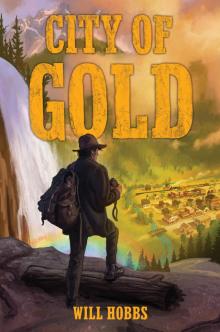 City of Gold
City of Gold Kokopelli's Flute
Kokopelli's Flute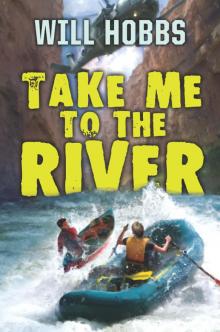 Take Me to the River
Take Me to the River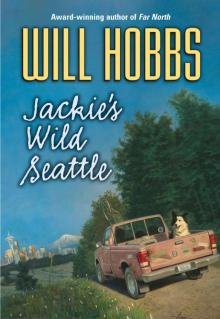 Jackie's Wild Seattle
Jackie's Wild Seattle The Maze
The Maze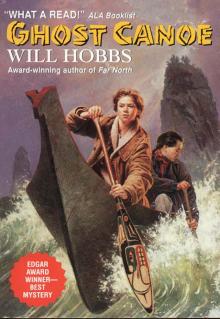 Ghost Canoe
Ghost Canoe Never Say Die
Never Say Die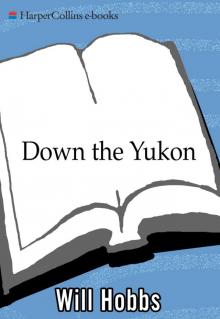 Down the Yukon
Down the Yukon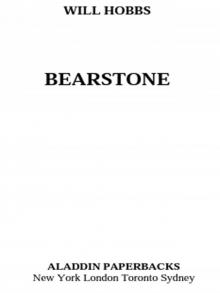 Bearstone
Bearstone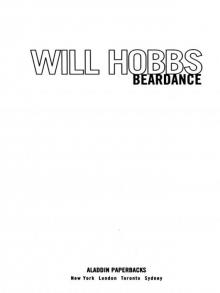 Beardance
Beardance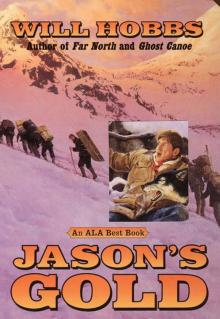 Jason's Gold
Jason's Gold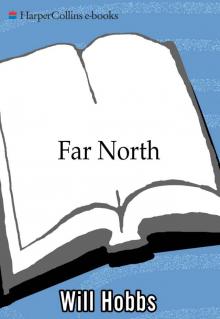 Far North
Far North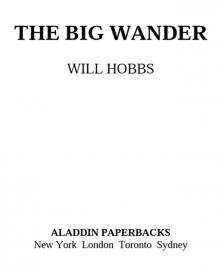 The Big Wander
The Big Wander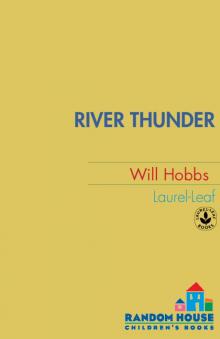 River Thunder
River Thunder Downriver
Downriver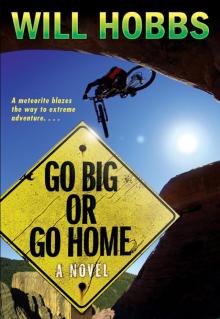 Go Big or Go Home
Go Big or Go Home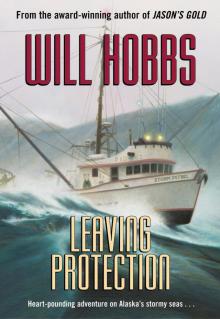 Leaving Protection
Leaving Protection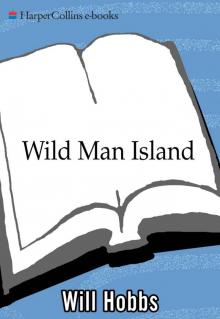 Wild Man Island
Wild Man Island